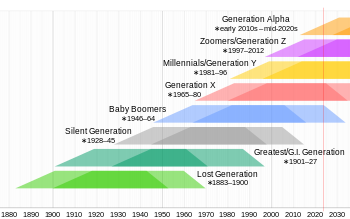Social generation
A social generation is a grouping of a whole generation of people (those born within a certain span of years) into a demographic category for the purpose of attempting to make generalizations about characteristics that might apply to all the group members. Examples in the Western world include:
- Generation Alpha - those born early 2010's to mid 2020's
- Zoomers (aka Generation Z) - those born 1997 - 2012
- Millenials (aka Generation Y) - those born 1981 - 1996
- Generation X - those born 1965 - 1980
- Baby Boomers - those born 1946 - 1964
- Silent Generation - those born 1928 - 1945
In demographics, marketing, and social science, a social generation may be called a birth/age cohort, and it means "people within a delineated population who experience the same significant events within a given period of time."[1] Analysis of social generations began in the nineteenth century, emerging from an increasing awareness of the possibility of permanent social change and the idea of youthful rebellion against the established social order. Some analysts believe that a generation is one of the fundamental social categories in a society, while others view its importance as being overshadowed by other factors including class, gender, race, and education.
There is not always agreement among various sources for the exact cut-off dates for each social generation.
Notes
- ↑ Pilcher, Jane (September 1994). "Mannheim's Sociology of Generations: An undervalued legacy". British Journal of Sociology 45 (3): 481–495. DOI:10.2307/591659. Research Blogging.
